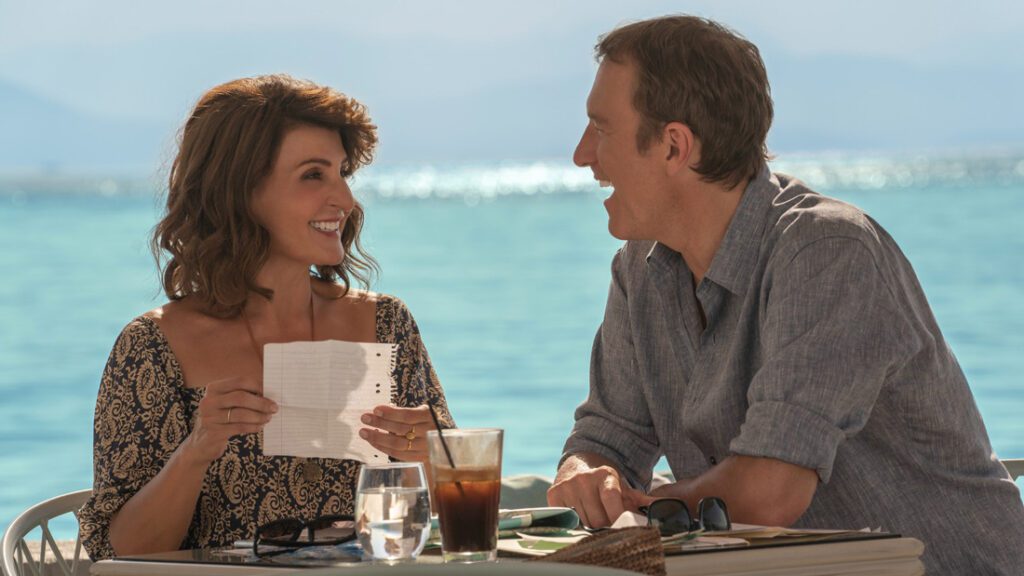Exploring Cultural Identity in ‘My Big Fat Greek Wedding 3’

1. Introduction
Exploring one’s roots and emotions is a central theme in many stories. When a person from a specific culture is brought up in another, tensions usually arise as a result of cultural blending. Stories are told of exploration of that tension and discovery of identity. This inquiry will explore cultural identity within the context of the films.
Land of the Dead chronicles the efforts of one dead man trying to liberate his people from a living oppressor’s grasp. My Big Fat Greek Wedding tells the story of a Greek-American woman trying to find her place in a world outside her family and close friends, a world dominated by those who do not share her cultural heritage. Both films explore the idea of cultural identity and the forces that shape such identity 1.
1.1. Definition and Significance
Cultural identity is a multifaceted concept referring to the aspect of each individual’s self-conception and self-perception influenced by their membership in a social group. Such groups can be defined on the basis of nationality, ethnicity, religion, gender, occupation, and other dimensions of social grouping.
The groups provide the individual with a coherent picture, the significance of where they fit in the world. This results in a certain group belonging and shared history, or collective memory which is based on past events perceived as significant by the individuals of the group. However, the cultural identity is neither coherent nor fixed over time.
On the contrary, it is dynamic and undergoes continuous changes, as it is closely interrelated to the changes in the context in which it is perceived and interpreted. Such changes in the group membership may result in re-categorization and reconsideration of the cultural identity. Minor groups in a dominating socio-cultural space often experience crises or insecurity in their collective identity based on stigmas ascribed by larger groups. Such majorities are often perceived as oppressors of the minor group identity, resulting in asymmetric power relations and group interactions.
The power relations are often contested in the public discourse using science, politics, and art as mediators. The use of film as an exploration of cultural identity and commentary on ethnicity conflicts and majority-minority power relations is widely adopted, ranging from documentary films to Hollywood comedies.
Cultural identity is closely interlinked with memory. Collective memory is a mode of cognition and social practice constituted by a web of interrelated private, public, local, and global memories produced, circulated, used, and consumed by individuals and social groups in both everyday life.
Film is a powerful medium of memory, evocation, and representation of identities, which can be collectively experienced by the masses, transcending the specificity of time and space. Moreover, film can become a part of memory and identity politics, the selectivity of the past aiming to legitimize a particular socio-political status quo or to redefine it.
While the memory is often projected and represented through specific genres or styles, cinematic representations of identity are bound to follow certain aesthetics and narrative conventions. As narrative films are often perceived as a reflection of the real world, they may offer portrayal and representation of cultural identity and collective memory.
“My Big Fat Greek Wedding,” an independent romantic comedy film produced in 2002, offers a clever exploration of Greek-American cultural identity through the character of Toula Portokalos, a 30-year-old woman feeling out of place and caught between two socio-cultural worlds. The film comments on the experience of otherness through cultural representation of the competing ideologies of Americanness.
2. The ‘My Big Fat Greek Wedding’ Franchise
The “My Big Fat Greek Wedding” films, including the recent third installment, embrace Hellenism’s rich cultural heritage. Traveling to Greece, the Portokalos family experiences their ancestral pride, challenging modern dilemmas like identity and diaspora. The narrative arcs and heartwarming humor make cultural identity relatable globally; yet, accuracy remains vital. Few film series share sincere representations of cultures, languages, and values; this franchise does through a unique blend of comedy, family, and romance.
The negotiation of cultural intimacy serves as the starting point. Filmmakers approached long-time collaborators and actors from prior films, seeking to remain true to the franchise’s vision and offer authentic and relatable portrayals of Greek culture. These creators’ positions influence the methods employed to tell Portokalos’ stories in more complex ways, and their negotiations reveal limitations inherent in cultural intimacy.
In the follow-up, cultural discussions continue alongside a distance from Greece, asking questions about what it means to belong without fully confronting the potential costs of Pappa’s home. Still, Eubridians from Portokalos’ village share familial spaces, languages, and cultural experiences, evoking warmth, connection, and intimacy with viewers and within the franchise.
Disjunctions of intention and impact emerge, revealing moments of exclusion or perceived difference. The viewer’s own expectations and positionality, based on individual experiences, education, and personal interactions, affect understanding and assessment of certain moments that resonate with them or highlight difference. Spanish best-friend dialogues and criticisms reflect on the audience.
The cultural intimacy of the franchise is opening up to view the humorous periphery of Greek culture as equally shareable and understandable because of its familiarity. The filmmakers’ own feelings of risk and hope mirror beliefs within contemporary Greek communities about how representations impact understanding of culture, language, and values by both natives and outsiders.
2.1. Overview and Impact of Exploring Cultural Identity in ‘My Big Fat Greek Wedding 3’

“My Big Fat Greek Wedding” was released in 2002. Written by and starring Nia Vardalos, it was produced, directed and co-written by Joel Zwick and was distributed by the Golden Globe and Academy Award-winning film and television production company, “Playtone”. Within the first three weeks, it broke records for the highest-grossing romantic comedy of all time, grossing 368 million dollars internationally, and the highest-grossing film in limited release, taking in over 23 million during its first week of release 1.
These are especially staggering figures considering its 5 million dollar budget and the fact that it was originally only slated for limited release. Ultimately, it won numerous awards during the 2003 award season, including the Academy Award for Best Original Screenplay.
“My Big Fat Greek Wedding 2” was released on March 25, 2016, fourteen years after the first. Once again written, produced, and starred in by Vardalos, the sequel, directed by Kirk Jones, chronicles the Portokalos family as they deal with the fallout following the revelation that a marriage certificate from Gus and Maria’s wedding was never signed by the priest, thus rendering them unmarried.
Compared to the first installment’s reception, the sequel performed relatively poorly, taking in only 16 million dollars during the opening weekend, the lowest for any film distributed by “Playtone” during its opening weekend, and 90 million dollars overall. Although it took in over sixty million dollars more than its production budget of 18 million, its return is quite modest compared to its predecessor’s overwhelming success.
3. Analyzing Cultural Representation in ‘My Big Fat Greek Wedding 3’
An analysis of the Greek cultural representation depicted in My Big Fat Greek Wedding 3, is presented. It examines the film portrayals of Greek culture, particularly scrutinizing the Greek-American lifestyle representation in the film. As the film attempts to portray the American lifestyle of Greek immigrants and their descendants, the authenticity of the film’s depiction of the American lifestyle is examined, as well.
It analyzes the strength of the stereotypes concerning this culture, and discusses the impact of the film on the audience’s perception of the Greek culture theme. Finally, it evaluates the cultural themes presented in the film. Based on food, language, family ties, and traditions, these themes contribute to a thorough representation of the Greek culture in the film 1.
Also, special attention is given to the selection of the film’s specific scenes and the examination of their contribution to the film’s overall representation of the Greek culture. Within this focus, the analysis examines the particular scenes that depict the food, wedding customs, family ties, and the Greek language usage of the characters, as these elements are pivotal in establishing a general understanding of the Greek culture, from a perspective both outside and within this culture.
The film, as a Greek-American comedy, is depicted as an appropriate vessel of the Greek culture representation outside of Greece, and a topic to examine the cultural identity questioning for a Greek-American at its center.
3.1. Portrayal of Greek Culture
‘My Big Fat Greek Wedding 3’ is a romantic comedy film that continues the story of Toula Miller as she navigates the latest family crisis. The film demonstrates how Toula and her husband, Ian, remain respectful and supportive of each other despite family drama. As the film heads to Greece, a journey to reconnect with roots, the film takes on a slightly different tone.
The importance of Greek culture and family identity is a recurring theme in the franchise. The Portokalos family is depicted as an active embodiment of Greek culture in daily life. Their business is a Greek restaurant and travel agency that does the travel plans for other Greek families.
The film vividly depicts Greek cultural practices, such as family gatherings on the eve of a wedding. Each family and culture has unique ways and practices. Either because of preservation or orientation, these ways shape everyday interactions and perceptions. Individuals in a culture embody cultural practices that connect to one’s identity.
In the context of the film, Greek ways shape how every character makes sense of their world. While ‘My Big Fat Greek Wedding 3’ playfully exaggerates Greekness, it does demonstrate everyday Greek practices specific to family gatherings.
Stunning views of Greece, together with Greek food, religion, and idiomatic expressions, are core elements of the film. In the film, family gatherings are depicted as loud and chaotic. Although immediate family gatherings are a routine, welcoming new members is a crash course of culture shock. Fernandez and Trokji explain how Puerto Ricans have a different way of understanding familial terms that shapes everyday interactions among family members.
In contrast to Western styles of remembrance, Puerto Ricans can freely disclose which ones are cousins and how they are related. There are as many familial terms to refer to all types of relatives as there are situational nuances. Similarly, in the film, characters refer to every family member as “cousin” or “uncle,” perplexing outsiders.
These familial terms and body language signify a close bond betwixt the characters indicated by how they comfortably touch each other’s body 1. Portraying such family practices in the film is not only shedding light on a specific cultural way but also subverting the perception of Greek family in the prior movie. Rather than fixating on individualism, which is accentuated by Toula’s internal conflict in ‘My Big Fat Greek Wedding,’ the Greek family shown in the sequel is depicted as a tightly knitted whole.
4. Impact of Cultural Identity on Character Development

Cultural identity nuancedly shapes character development and arcs within a narrative. In “My Big Fat Greek Wedding 3,” the cultural identity of the Portokalos family permeates all characters and influences their actions and decisions. It offers opportunities for growth while also emphasizing heartfelt highs and lows, underscoring the significance of cultural identity in characters’ development and transformations.
This is particularly well illustrated through Toula Portokalos, the story’s protagonist, who navigates her cultural identity in various ways such as her marital obligations and her interactions with her husband’s culturally different family. This cultural exploration also leads her to reconcile and embrace her cultural identity in all aspects of her life.
Toula embodies a cultural chameleon; she grows up in an immigrant family, grappling with her roots and her family’s culture while also assimilating into American culture and customs. This dual cultural identity complicates Toula’s development as she struggles to find her place in both cultures. For example, as a child, she does everything her mother tells her to do, such as “come home and eat with us.
” She even has to plead her case as to why she should join another family’s Thanksgiving dinner, a typical American tradition. These examples embody her family’s strict adherence to Greek customs, which she tries hard to accept even if their practices seem radical and non-mainstream. For instance, her family believes,
“In Greece, we may be a little more extreme. We believe the people you choose to love should be the people you marry,” and thus forces her to comply with Greek customs as she gets her first boyfriend, especially one from a Greek family: “There was a nice Greek boy, we’re calling him, and I thought you two would make a wonderful couple.
” Growing up alongside familial expectations, Toula finds it difficult to adapt to a non-Greek life even though she desperately wants to fit in. She remarks, “I lie awake at night wishing I could be someone else. I wish I was Laura Ingalls Wilder, or Jo March, or a clever little boy living in a treehouse.” This cultural conflict creates internal chaos within her as she orchestrates various plans as to how she would cope with life, including skipping school, moving away, and changing her image—all plans that her family will strongly oppose.
But Toula’s cultural conflict extends beyond that of ordinary ethnic families as her father takes it to another level. In Greek culture, the father, as the patriarch, dominates the family, and her father, as a Greek immigrant in America, embodies this authority and control even in minutiae. He warns, “If anyone harasses you or touches you in any way that makes you uncomfortable, I will kill them. Just remember that.”
He even does background checks on her boyfriend and properly investigates his family heritage and social life, believing it to be more important than college degrees. After a date with Ian, Toula appears in church with an abundance of jewelry. The priest asks, “Did you convert to a different religion?” The family member then interjects, “No, it’s just Toula,” emphasizing how far away she strays from her previous self, which she hopes can win her father’s approval.
4.1. Case Study: Toula Portokalos
Toula Portokalos is a second-generational Greek-American who immigrated from Greece to Chicago with her parents. She is a key character in the film “My Big Fat Greek Wedding” series. Segregated from the outside world, Toula begins to explore who she is within and outside of her cultural context, particularly her Greek heritage, family, and ethnic values.
Through Toula’s character development, this case study analyses the implications of cultural identity. By the end of the film, her development is completed when her husband greets her with “You’re a Greek girl, you’re a Portokalos, you can’t leave your family.” Her response “you’re right” denotes her acceptance of her cultural legacy. At the beginning of the film, Toula indicates she feels torn about her Greek culture by saying “I’m a Greek. I’m a Portokalos.
I was born in the Greek community. I’ve always been here. I didn’t even know I had options.” The depiction of Toula’s childhood plainly shows that she embraces little of her heritage. As Toula etches “My name is Toula, and I am a Greek” on the blackboard, she stands outside the group. She holds a contradicting culture, pride in her heritage but loneliness in the Greek context. This case study ends with Toula’s acceptance of her Greek heritage and hence reveals a complex aspect of cultural identity concerning individual characters 2.
5. Conclusion and Future Directions
The exploration of cultural identity through food and family connections in My Big Fat Greek Wedding 3 brings forth intriguing complexities and offers a promising avenue for future scholarship. Exploring the intersection of culture, cuisine, and family in films like My Big Fat Greek Wedding, there are opportunities for deeper analysis balanced with the cultural critique of more contemporary films like Crazy Rich Asians.
Gender is a key component in shaping the cultural identities of the characters and attracting tension between generation groups. In My Big Fat Greek Wedding 3, the identity dynamics take a different turn than those in the previous two films. Thoughts on possible follow-up research on the individual films with different lenses or the trilogy as a collective film are also shared.
As the third addition to my favorite film trilogy, revisiting the My Big Fat Greek Wedding films reminds me of my beloved culture. Watching ethnic food brought back the memorable dishes and even the cooking process I grew up with. It is intriguing to witness the intersection of culture, cuisine, and family in other ethnicities and observe their similarities and differences with my own culture.
While the My Big Fat Greek Wedding films provide a good analysis starting point, the culture portrayed within the food and family connection is not developed thoroughly. This provides an opportunity for a balanced deeper analysis of this aspect while bringing a cultural critique on the more contemporary film, Crazy Rich Asians.
Also read: Uncovering the Trendy Smoothie Leaf Crossword Clue
References:
1. Monti S. What’s cooking in multicultural films? Food, language and identity in British and American audiovisual products and their Italian dubbed version. 2019. [PDF]
2. A Dongas S. The bicultural world of daughters of Greek immigrants: Acculturation and psychological adjustment. 2007. [PDF]